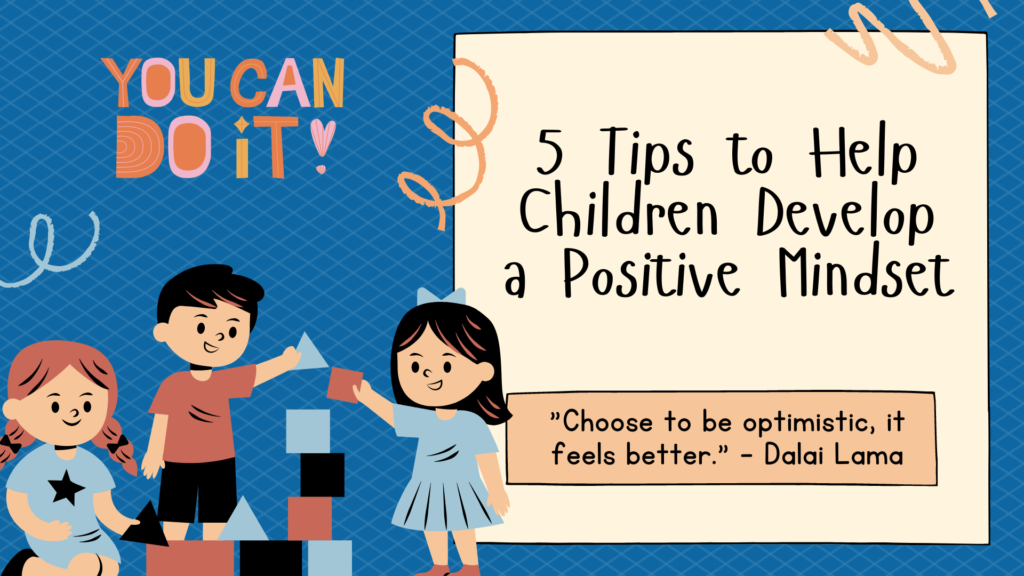Picture this positive mindset: Your 5-year-old child confidently takes on a challenging puzzle, his eyes shining with determination. With each failed attempt, he brushes off disappointment, trying again and again until, finally, a triumphant smile lights up his face as he completes the puzzle successfully. This reflects the power of a positive mindset in children.
Fostering a positive mindset in children from an early age has far-reaching benefits. It lays the foundation for their emotional well-being and future success. With a positive outlook, children are better equipped to handle challenges, build resilience, and maintain healthy relationships. They learn to approach setbacks with optimism, viewing them as opportunities for growth. A positive mindset also fosters self-belief and confidence, empowering children to pursue their goals and dreams with a sense of determination and enthusiasm.
In this blog post, let’s explore 5 tips to help children develop a positive mindset that will pave the way for a brighter and more fulfilling future.
1. Lead by Example
Children mirror the behaviour of the adults around them. As parents and role models, it is essential to exhibit a positive attitude. Demonstrate optimism, gratitude, and a growth mindset in your daily interactions. Create a supportive and nurturing environment where your child feels safe to express their feelings and emotions. Encourage open communication and active listening, allowing them to share their thoughts without judgment. Researchers have found that by modelling a positive outlook and creating a supportive environment, you inspire your children to adopt the same mindset.
2. Encourage a Growth Mindset
Developing a growth mindset in children involves teaching them to embrace the word “yet” and view challenges as opportunities for learning and growth. For instance, if a child says, “I can’t solve this math problem,” encourage them to add “yet” at the end and say, “I can’t solve this math problem yet, but I will keep trying and improving.” By doing so, children learn to see mistakes and failures as stepping stones to success, fostering a mindset that values continuous learning and development.
3. Praise efforts and persistence
Acknowledge and celebrate your child’s effort and determination, regardless of the outcome. For instance, if a child puts in extra effort to study for a test but doesn’t get the highest grade, praise them for their dedication and perseverance. This approach helps build your child’s self-esteem, emphasizing that success is not solely defined by results but by the commitment they put into their endeavours. This fosters a sense of self-worth based on effort and resilience, encouraging them to approach challenges with a positive attitude.
4. Cultivate Gratitude
Cultivating gratitude in children involves encouraging them to express thankfulness daily, such as keeping a gratitude journal or sharing three things they are grateful for each day. For example, if a child writes in their journal, “I’m grateful for spending time with my friends, enjoying ice cream, and getting help with homework,” they learn to focus on positive aspects and cherish life’s simple pleasures. This practice instils a positive mindset, teaches children to appreciate the little joys; fostering happiness and contentment in their daily lives.
5. Encourage Positive Self Talk
Encouraging positive self-talk in children involves raising their awareness of their thoughts and guiding them to replace negative self-perceptions with uplifting affirmations. For instance, if a child is feeling nervous before a test, you can teach them to say, “I am prepared and capable of doing well.” By fostering this habit, children develop increased self-confidence and belief in their abilities. This positive mindset sets the stage for healthier emotional well-being and a more optimistic outlook on challenges they may face in life.
Developing a positive mindset in children is a priceless gift that sets the stage for a happy, fulfilling, and successful life. As parents and caregivers, we have the privilege and responsibility to nurture our children’s minds and hearts, cultivating that positive mindset that will guide them towards a bright and promising future.




